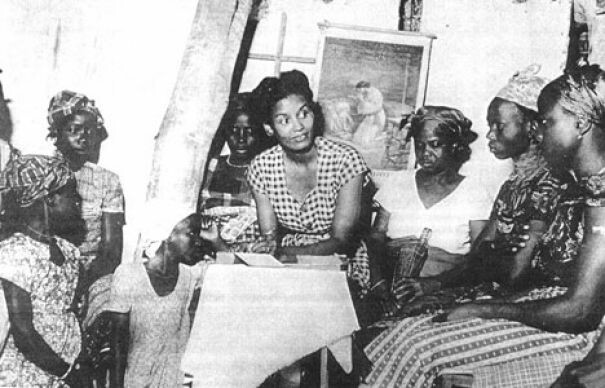Timeline: Methodism in Black and White

Missionary Vivienne Gray served with her husband, Ulysses, in Liberia, 1948 to 1988. Photo courtesy of New World Outlook.
This timeline first appeared in New World Outlook, May-June 1992. Adapted by permission and updated by United Methodist Communications.
1758
John Wesley baptizes two “Negro slaves,” at least one woman, thus setting the pattern for receiving people of color into the societies and the church. These two return to Antigua to start the Methodist society in the “new world.”
Anne Schweitzer, a black woman, becomes a founding member of the first Methodist society in Maryland. Two years later, another black woman, known to us only as Bettye, is one of five persons to attend the Methodist services inaugurated by Philip Embury in New York City. When the John Street Church is built in 1768, the names of several black subscribers appear on its roster.
1784
The Christmas Conference in Baltimore founds the Methodist Episcopal Church. Among those riding out to issue the call for the conference is “Black Harry” Hosier. Born a slave about 1750, Hosier receives a license to preach in 1785 and becomes one of the best preachers and most effective early circuit riders.
1790
Drawn by the Methodist Episcopal Church’s anti-slavery stand, blacks (slave and free) make up 20 percent of the 57,631 American Methodists.
1791
John Wesley dies. His last letter is one written to anti-slavery crusader William Wilberforce, urging him to “Go on, in the name of God and in the power of his might, till even American slavery (the vilest that ever saw the sun) shall vanish away before it.”
1794
Increasing segregation within churches causes Richard Allen to form the Bethel African Methodist Episcopal Church in Philadelphia. In 1796, blacks walk out of John Street Church in New York and eventually build the Zion Chapel. Similar movements occur in other communities.
1805
The African Union Church is formed.
1816
The African Methodist Episcopal church is formed in Philadelphia. Richard Allen becomes its first bishop.
1819
John Stewart is named as the first missionary to the Wyandot Indians. A black man converted in 1814, he was engaged in this ministry for several years before obtaining a license to preach in 1819.
1821
The African Methodist Episcopal Zion Church is formed in New York. James Varick is elected as first general superintendent.
1844
Rising tensions over slavery come to a head in the General Conference of the Methodist Episcopal Church when Bishop James O. Andrew of Georgia is told to desist from the exercise of his office until he frees slaves passed down from his wife’s estate.
1845
In a break along regional lines, the Methodist Episcopal Church, South, is formed in Louisville, Ky.
1858
The Liberia Conference elects Francis Burns as bishop. The first missionary bishop of the Methodist Episcopal Church, he had served as a missionary to Liberia for 24 years.
1866
A group of black Methodists within the Methodist Episcopal Church, South, petition the General Conference for their orderly dismissal from that church.
1870
Those former members of the Methodist Episcopal Church, South, found the Colored Methodist Episcopal Church in Jackson, Tenn.
1902
Susan Collins goes as a missionary to Angola where she is welcomed as “one of us” and serves 29 years.
1920
The Methodist Episcopal Church elects Robert E. Jones and Matthew W. Clair Sr. as bishops.
1939
The Methodist Episcopal Church; the Methodist Episcopal Church, South; and the Methodist Protestant Church
1956
The General Conference, meeting in Minneapolis, Minn., adopts Amendment IX, allowing transfers of churches and conferences out of the Central Jurisdiction into geographical jurisdictions.
1968
The Methodist Church and the Evangelical United Brethren Church
Roy C. Nichols becomes the first African American to be elected bishop by a regional jurisdictional conference in the new United Methodist Church. Black Methodists for Church Renewal is organized. The General Commission on Religion and Race is formed, with Woodie White as the first African-American to head a United Methodist general agency.
1976
Mai Gray becomes the first African-American president of the Women’s Division, General Board of Global Ministries.
1977
Trudie Kibbe Preciphs becomes the first African-American member of the secretariat of the General Commission on the Status and Role of Women.
1984
Leontine T.C. Kelly becomes the first African-American woman to be elected bishop.
1990
Charlotte Ann Nichols (Peninsula-Delaware Conference) and
2000
General Conference delegates participate in a service of repentance for racism within the denomination.
2004
General Conference delegates celebrate the African-American witness and presence within The United Methodist Church and recognize “those who stayed” in spite of racism.
2008
16.6 percent of the U.S. delegation to the 2008 General Conference are African-American.
2009
African-American United Methodists speak at the inauguration of the first African-American U.S. president.
